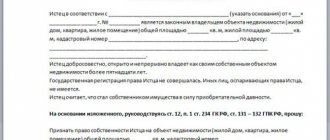Property rights concept
The right of ownership is the right of a person to dispose of his property in accordance with his interests within the limits of the law. It is regulated by articles of the Civil Code, as well as the Constitution of the Russian Federation. Individuals and legal entities may also possess objects of intellectual property - the result of creative activity.
Property rights are considered in an objective and subjective sense. In an objective sense, it means a set of civil law norms that regulate and protect the material wealth of certain individuals. That is, this means that the norms:
- establish the belonging of a thing to certain persons;
- determine the owner’s powers to use his property;
- establish means of protecting the rights of the owner.
In a subjective sense, it provides a measure of acceptable behavior of the owner.
Contents of property rights
The content of property rights implies the totality of the rights and obligations of the owner in relation to his property. They must not contradict the law or violate the rights and interests of others. The content of property rights includes three powers: the right of possession, the right of use and the right of disposal.
The right of possession secures by law the physical possession of a thing or material means. Ownership is determined by law. One such basis may be a purchase and sale agreement. There are two types of ownership: lifelong and temporary. Lifetime ownership begins from the moment the property begins to belong to the owner and ends from the moment it is alienated. There is also lifelong inheritable ownership. This means that all powers pass to the heirs of the subject. Temporary possession implies the exercise of powers without transfer of ownership. For example, ownership of premises under a lease agreement.
The right of use provides for the use of a thing for the purpose of obtaining income or useful properties from its operation. It is interconnected with the right of ownership, since, as a general rule, you can use property only by owning it. The right of possession and use may belong not only to the owner of the thing, but also to persons who have received authority from the owner. The right of use can be divided into two main types: fixed-term and indefinite. Urgent indicates a specific period. In most cases, fixed-term use is carried out under a lease or sublease agreement. Perpetual use arises after the acquisition of a thing into private ownership. Exceptions include state and municipal property. According to paragraph 1 of Article 39.9 of the Land Code of the Russian Federation, land plots that are in municipal or state ownership may be provided for indefinite use.
The right of disposal is the right to dispose of property legally. The owner himself determines the legal fate of the thing. This means that he can exchange, sell, gift or rent out his property.
Popular questions about this article
✅ What is property rights?
The right of ownership is the right of a person to dispose of his property in accordance with his interests within the limits of the law.
✅ What forms of property rights exist?
Civil legislation provides for three forms of property rights:
- Private property is the right of a citizen and legal entity to certain property, fully protected by law.
- State ownership is a form of ownership in which property, as well as the means and products of production, are owned in full or on the basis of shared or joint ownership.
- Municipal - the property of the municipality, that is, the population living in the territory of the municipality.
✅ What types of common property are there?
Joint property is divided into three types :
- Common property of spouses;
- Common property of a peasant (farm) enterprise;
- Common ownership of privatized housing.
✅ Are there real rights?
Property law is a subjective civil law, the object of which is an individually defined thing. It allows the owner to use his property, as well as receive benefits when disposing of the thing.
Methods for restoring title documents for real estate
Dear readers!
Our articles talk about typical ways to resolve legal issues,
but each case is unique. If you want to know
how to solve exactly your problem - call the following numbers:
8 Moscow 8 St. Petersburg
or if it’s more convenient for you, use the online consultant form!
All consultations with lawyers are free.
First of all, it is necessary to answer the question of what constitutes property rights. The Russian Code states that, in essence, property rights include a set of the following rights: ownership of a property, as well as the use and further disposal of it.
Possession is the possession of a certain object, to which only the owner has access, and no one else except him. That is, if you are the owner of a home, then no one except you and the people you allow has the right to enter its territory. Physically, you are protected from unauthorized persons by doors with locks, but in fact you are under the protection of the title documentation for the real estate property.
Moreover, you can use the apartment not only if you are its owner, but also with the permission of the owner of the apartment. For example, if a person allowed you to live in his apartment for some time and gave you the keys, this does not mean that you are now the owner. But, nevertheless, you have the right to live in this apartment.
The order involves a decision on further actions with the apartment. You can keep it, draw up a deed of gift, sell it, and the like. Disposal may only be made by the legally capable owner or the legal representative of the incapacitated owner. This is done exclusively within the framework of the law, that is, without violating the law or other legal act.
So, ownership gives the right to realize a whole range of possibilities. But only the owner of the apartment can use them. And you can confirm this with the help of housing documents.
There are two types of such documents:
- Legal documentation.
- Documentation of the title-certifying (title-certifying) type.
There are several types of documentation, due to different methods of obtaining ownership.
Purchase and sale. In this option, it is assumed that ownership rights will be established by the purchase and sale agreement. It is drawn up in three copies, and each of them has equal legal force. One copy remains in the hands of each party to the transaction, and the third copy is stored in the Office of the Federal Service for State Registration and Cadastre.
The title documentation for the sale of real estate must contain all information about the housing - its price, as well as the last name, first name and patronymic of the persons entitled to reside after the acquisition.
Deed of gift. In such cases, the document of title to the property is considered to be a gift agreement (deed of gift), that is, when one party transfers real estate to the other party free of charge. Such a contract is divided into two types: real and consensual.
In the first case, they simply give you housing as a gift, and immediately after concluding the contract you become its full owner. But the second type of document provides for the presence of certain conditions for obtaining real estate. That is, you will become a home owner only after successfully graduating from college and the like.
Barter agreement. This title document is used when exchanging one apartment for another. If there is a price difference, one party is obligated to compensate the other party for the difference. In this case, it is very important that the technical passport of the BTI and the certificate of state registration reflect real information about the condition of each property. As for the remaining details when concluding a transaction, they are absolutely similar to transactions for the purchase and sale of real estate.
Inheritance. A document on the right to inheritance also refers to the title-establishing type of property documents. It is issued six months after the death of the testator. It is this document that the heir will need at the registration and cadastre service. This applies to inheritance regardless of the type of transaction.
Contract for the transformation of property rights (privatization). To obtain title documents for housing during privatization, you should contact the local government authorities that are involved in the implementation of this type of real estate transfer.
If several owners are involved in the transaction, then each of them must receive a title document for the property. The papers must indicate which part each owner is claiming. However, privatization does not apply to married couples who register housing in common ownership.
Investment. Share building. Although these are different types of transactions, they are united by common nuances. In each case, the agreement is not concluded for a specific real estate property that one party buys from the other, but about the developer’s obligations to transfer the constructed property. It is possible to register ownership only after analyzing the technical documentation and inspecting the premises in order to identify the absolute compliance of the documentation with the current state of affairs.
There are two key differences between investing and shared construction. In the first case, a purchase is supposed to be made for further profit. Such transactions are usually concluded between legal entities. In another case, one party is an individual (who purchases housing for living).
We suggest you read: Registration of ownership of an apartment in the MFC: what documents are needed, terms, cost
Each agreement is accompanied by a transfer act, which must be signed by both parties entering into the transaction. In addition to the actual acceptance, one party in this document must indicate the absolute compliance of the object with the stated obligations.
In this case, events may develop differently depending on what set of rights and obligations a particular person has in relation to the land plot on which the construction of the building has not yet been completed.
A land plot can be in the following statuses:
- Property.
- Indefinite continuous use.
- Inherited lifelong ownership.
It is also important to take into account the type of permitted use. If we are talking about individual housing construction, then difficulties should not arise, since the name already speaks for itself about the purpose of this type of plot.
But things are completely different with private household plots (auxiliary personal holdings). If it is located behind a populated area, then the construction of objects on such a site is prohibited, because such a plot of land, according to the law, belongs to the field. Of course, you will not be able to register a building on such a site. According to the law, government agencies will oblige you to demolish the building, regardless of the stage of its completion.
If you have title papers for the land, this means that you are its owner, and therefore the owner of the unfinished object. In this case, you have the opportunity to register the object.
To do this, you must carry out a list of the following works:
- Carry out work on technical inventory of the facility.
- Obtain a permit for construction work.
- Obtaining a cadastral passport for an unfinished object.
- Submit the required package of papers to state registration.
The above list of actions is appropriate when the land plot is owned. If we are talking about regular use (indefinite), then such ownership is possible only for government agencies, but not for individuals.
Lifelong inheritable ownership is not property: according to the law, land plots belong to the state, and their “lifelong owner” does not have the right to dispose of them, that is, to formalize various types of transactions, with the exception of inheritance. Government authorities have the right to seize such areas in case of improper use or in cases where the country urgently needs it.
A citizen has the right to construct objects and then register them in his name. According to the law, the owner can dispose of them at his own discretion, that is, he has the right to sell, issue a deed of gift, etc. In such a case, from a legal point of view, the rights to the land plot will transfer to the new owner upon sale of the property.
There is another option, which is to register the land as a property. This procedure should begin with land surveying. After that, we submit to the state authorities a certificate with information about the land survey, a document indicating the provision of the land plot for lifelong inheritable possession and a cadastral passport for it. Then the process of registering unfinished property is carried out in a similar manner as registering owned land.
Sometimes it happens that for some reason the owner does not have documents, for example, they were damaged or lost, where can they be restored in this case?
If the documents were issued before February 1998, then you will have to contact your city's Housing Department. You will need to fill out an application for restoration of title documentation. But you will only be given copies of the privatization certificate. There you can also receive a receipt for payment of the state duty. After 15 working days, you will receive new documents.
If privatization was completed after the above date, then you will have to contact Rosreestr for a certificate on the contents of the title documentation.
Experts in the field of housing law always recommend insuring yourself against possible risks before dealing with housing, including from scammers, of whom there are many in the modern real estate market. And they advise you to obtain supporting documentation in advance - a certificate of title documents for an apartment or any other piece of real estate.
Since 1998, ownership of an apartment can only be confirmed by a corresponding entry in the Unified State Register of Real Estate. How to obtain an extract from the Unified State Register of Real Estate? The applicant may request information:
- personally contact the real estate registration authority or MFC;
- send a paper request by mail;
- online - by requesting an electronic document using the State web service
Forms
The form of ownership is a definition of the legal regime of property and the list of possibilities that its owner has in relation to this property. Civil legislation provides for three forms of property rights.
Private property is the right of a citizen and legal entity to certain property, fully protected by law. It is divided into the property of a citizen and a legal entity. Objects of private property of citizens are residential buildings, dachas, apartments, land plots, garages, household and personal consumption items, money, securities, enterprises, media, vehicles.
State ownership is a form of ownership in which property, as well as the means and products of production, are owned in full or on the basis of shared or joint ownership. The state may own any property that is necessary to carry out its functions. Also, it may have shares in joint stock companies of various forms of ownership. State property is divided into federal property, which belongs to the Russian Federation, and property, which belongs to the constituent entities of the Federation. They are republics, territories, regions, cities of federal significance, autonomous regions and autonomous okrugs.
Municipal property is the property of a municipal entity, that is, the population living on the territory of the municipality, which includes:
- municipal lands and other natural resources;
- enterprises and organizations, educational, healthcare, cultural and sports institutions;
- other movable and immovable property.
In addition, municipal property includes funds from the local budget, extra-budgetary funds, and property of local government organizations. Owner rights are exercised by local government bodies. By law, they have the right to transfer municipal property for temporary or permanent use to individuals or legal entities. Local government bodies determine in agreements and contracts the conditions for the use of objects being privatized or transferred for use.
Educational materials
Economic thought of the 19th century made a significant contribution to the study of property as a central economic category. The French economist Pierre-Joseph Proudhon (1809 – 1885) defined the essence of property with the following phrase: “Property is theft.” Although this definition has not received recognition, there is a rational grain in it.
It lies in the fact that ownership is based not on natural, but on social relations, since if a thing belongs to a certain person, then it cannot belong to another. Consequently, the category of property arises only in human society. Robinson, on a desert island, does not even think about the concept of property. The category of property occurs and is associated with both people and things. It cannot be considered without things and without a society of people.
Thus, property is a relationship between people that expresses a certain form of appropriation of material goods (things), and especially decisive things - the means of production.
The role and place of property in the system of social relations gives the most complete picture of it.
Property is the foundation, the basis of the entire system of economic relations. The nature of distribution relations in society, as well as the nature of exchange and consumption, depend on the established forms of ownership. The property status and level of consumption of individual social groups of the population depend on property.
Property is a historical category. Its forms change with changes in the method of production. However, the transition of one form of ownership to another can occur in an evolutionary way, i.e. the death of ineffective forms and replacement by more viable forms. There is also a revolutionary way to replace forms of ownership, i.e. violent methods of establishing new forms of ownership.
Theoretical research is most often aimed at clarifying private and public property. Private property expresses the appropriation of the means of production and the results of labor by individuals - individuals. Social ownership means the joint appropriation of the means and results of production. It connects producers with the means of production as a common property.
The historical mission of public ownership of the means of production is to overcome the antagonism between labor and the appropriation of the means of production and the results of labor. Social ownership of associated workers can only take place if the owners of the means of production are also the owners of the surplus product.
Property relations presuppose the presence of subjects and objects of property. The subjects are the individual, the collective, and the state. As objects of property - means of production, consumer goods, land, its subsoil, water, forests.
The state became the representative or subject of public property in the USSR. At the same time, workers became the owners of only the necessary product. The owners in society inevitably turned out to be the “relevant bodies”, and the workers, proclaimed the owners of the means of production and all public property, did not turn out to be such.
Nationalization of property has occurred, when an enterprise has more economic responsibility and fewer economic opportunities, and the state apparatus has the opposite. High state monopoly on the means of production led to the alienation of workers from property and production management, and consequently to a decrease in their labor and social activity. The property relations that have developed in the USSR have become one of the factors hindering socio-economic progress.
State enterprises were not economically interested in using new achievements of science and technology. The lack of competition deprived enterprises of economic incentives to improve product quality and reduce production costs.
Within the framework of private property, in practice there are various forms of it:
- individual labor private property;
- individual property using hired labor;
- collective form of private property (cooperatives, partnerships, joint stock companies).
In a market economy, there is also state ownership in the true sense of the term, but not identified with public, national property. In the US economy, state ownership amounts to up to 10%, currently in Russia it is about 35%.
An analysis of the concept of property shows that it expresses not only economic, but also legal relations in society, therefore it is simultaneously a category of both economics and law. Without legal registration of property objects by the relevant entities, it is not possible to use the means of production and manufactured products. Legal and economic property relations are closely interconnected and interdependent.
In the economic literature, three levels of appropriation of property objects are most often distinguished:
- right of ownership, i.e. the right of exclusive control over goods;
- right of use, i.e. the right to use the beneficial properties of goods for oneself;
- right of disposal, i.e. the right to decide who and how will ensure the use of benefits.
Legal decisions and legal acts can be important during critical periods in the development of society. With the help of law, it is possible to solve economic problems of changing established property relations. It is this path that has been chosen at present in the restructuring of property relations in countries that in the past built socialism and communism. In place of totalitarian state property, various forms of private and associated property are being created.
For the effective functioning of various forms of ownership in a market economy, it is necessary to legislate three different objects of property:
- real estate (real estate) – industrial and non-industrial premises, roads, transport facilities, infrastructure facilities, land;
- movable property (movable property) – freely movable property: machinery, equipment, tools, furniture, securities, etc.;
- intellectual property – inventions, electronic software, manuscripts, works of art, etc.
Intellectual property rights are secured by patents, copyrights, trademarks, etc. The importance of intellectual property especially increases in a market economy.
Common property
Common property is the ownership of the same property by several persons at once. The right of common ownership is the right of two or more persons who jointly own, use and dispose of property that constitutes a single whole.
According to paragraph 2 of Article 244 of the Civil Code of the Russian Federation, there are two types of common property.
Shared ownership implies that each owner has a share in the common ownership. If the law does not indicate that the property is joint, then it is recognized as shared property. Shares are considered equal if they are not specified. The size of the share may change in cases where the composition of the participants changes or improvements are made to the property. When making improvements to the property in the prescribed manner, the participant has the right to increase his share in proportion to the increase in the value of the common property.
Joint property is a type of common property in which the participants have shares that are not predetermined in the common property. This means that the shares are recognized as equal unless otherwise provided by law.
Joint property in turn is divided into three types :
- Common property of spouses;
- Common property of a peasant (farm) enterprise;
- Common ownership of privatized housing.
Common property of spouses is property acquired during marriage, unless the agreement provides for a different property regime. Property acquired before marriage by each spouse, as well as property received as a gift during marriage, is his property. Items for individual use, for example, clothing or shoes, except for jewelry and luxury items, although acquired during marriage at the joint expense of the spouses, are recognized as the property of the spouse who used them.
The common property of a peasant (farm) enterprise is property that belongs to its members on the right of joint ownership, unless otherwise provided by law or agreement. The joint ownership of a peasant farm includes a provided or acquired land plot, outbuildings or other outbuildings, reclamation structures, livestock, poultry, agricultural machinery and equipment, vehicles and equipment. Income, fruits and products that were received as a result of the activities of the farm are the common property of the members of the farm.
For the privatization of housing , persons who had the right to permanently use residential premises at the time of privatization become the owners of this housing after its completion. The privatized home becomes the common joint property of the tenant and all family members who permanently reside and who are temporarily absent, unless otherwise specified in the agreement between them.
The role of the certificate of ownership
The main piece of paper that can confirm that you are the owner of real estate is a certificate of registration of rights issued by Rosreestr.
From the latest version of the certificate form (since the type changed with changes in legislation), it was possible to find out which documents confirming the ownership of real estate were provided to the registering institution.
The title documents will be discussed further in the text, since the Certificate of Ownership of Real Estate has now been cancelled. This happened as a result of changes in Russian legislation in July 2021. However, it is necessary to know the role of this document (even if it is already in the past):
- confirmation that the owner is the person whose name appears on the certificate (or several people) and this is recorded in the unified register;
- It is impossible to carry out any actions with real estate without confirmation of rights to this. That is, previously, without having a certificate of ownership in hand, it was impossible to buy/sell, exchange, donate, or inherit an apartment and/or land plot;
- protection against various types of fraudulent actions aimed at depriving the owner of his property.
We suggest you read: The employer does not allow you to go on study leave
At the same time, it is necessary to understand the difference between the concepts of “owning real estate” and “owning real estate.” In the first case, you can only use the property (for example, live in an apartment). Registration of property rights also makes it possible to dispose of your real estate (for example, sell or donate).





